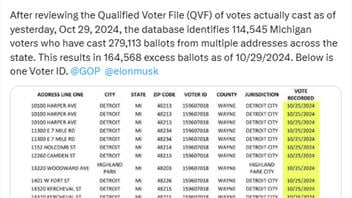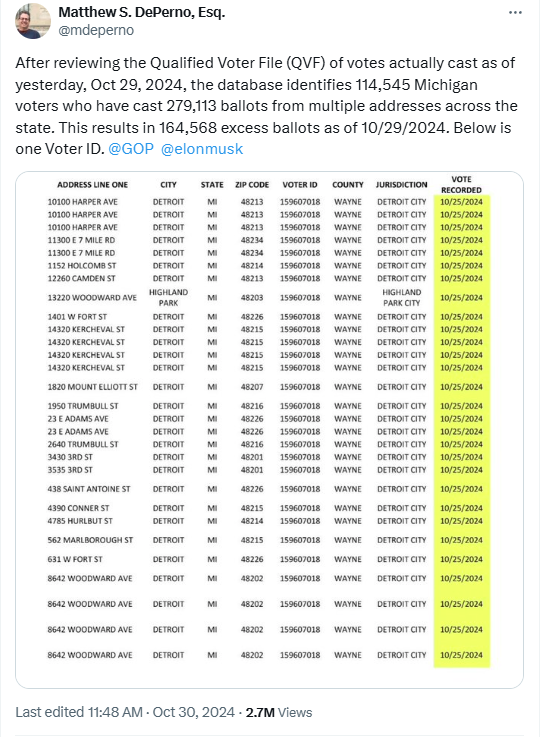
Do multiple entries of the same "Voter ID" casting ballots from different addresses on the same date in Michigan's Qualified Voter File indicate potential fraud? No, that's not true: Michigan's Department of State told Lead Stories that the Qualified Voter File only allows one ballot per voter per election. A spokesperson explained that "formatting errors" in displaying the database incorrectly showed that "individual voters were casting multiple ballots in this election."
The claim appeared in a post (archived here) published on X, formerly Twitter, on October 30, 2024. The post's caption said:
After reviewing the Qualified Voter File (QVF) of votes actually cast as of yesterday, Oct 29, 2024, the database identifies 114,545 Michigan voters who have cast 279,113 ballots from multiple addresses across the state. This results in 164,568 excess ballots as of 10/29/2024. Below is one Voter ID. @GOP @elonmusk
This is what the post looked like on X at the time of writing:
(Source: X screenshot taken on Wed Oct 30 21:31:51 2024 UTC)
The post provided no evidence to support its false assertion that individuals across Michigan were casting multiple ballots, purportedly resulting in tens of thousands of fraudulent votes.
Michigan's Election Fact Center
Asked for a response to the claim that Michigan residents voted more than once, Cheri Hardmon, senior press secretary for the Michigan Department of State, directed Lead Stories to the Secretary of State's Election Fact Center (archived here) in an October 30, 2024, email. The website said, "The Qualified Voter File only allows one ballot to be accepted per voter in every election - a formatting error has been corrected." Each registered voter is linked to a unique voter ID number.
The Election Fact Center's explanation continued (emphasis theirs):
Voters can only vote once in every election. A recent social media post has taken a data report that included formatting errors to incorrectly claim that individual voters were casting multiple ballots in this election. The data error has been identified and corrected.
The Qualified Voter File (QVF) maintains a record of each qualified and registered voter with an associated Voter ID that provides a unique identifier.
Whenever a voter moves, the associated address change is added as part of the history of the voter record with the same Voter ID in QVF. For voters who move frequently, such as college students, there may be a large number of address changes associated with a single record. Their voter registration will be active only at the last address at which they registered. The QVF does NOT allow for multiple ballots to be accepted for the same voter or Voter ID.
The Fact Center, referring to yellow highlighting in the post that is the focus of this fact check, went on to explain what the data in the post show. It said (emphasis theirs):
Recently, the Bureau of Elections identified a formatting error in a routine report that shows the list of voters who have cast a ballot either by absentee or early voting ballot. The formatting error in the data export process generated a line in the exported report [highlighted in yellow above] for each formerly associated address of each individual voter listed, resulting in the same ballot for the same voter appearing on multiple lines of information all associated with one unique Voter ID.
Each of these voters only had one vote recorded for this election. This error in the data export process has been corrected and these erroneous extra lines no longer appear on the report.
Also, the Fact Center website explains how the voter registry is kept up to date. It says:
Michigan's voter rolls are maintained in accordance with state and federal law. Michigan's list of registered voters is maintained on the Qualified Voter File (QVF), a database developed by the state of Michigan and maintained by municipal and county clerks and the Bureau of Elections. The QVF contains the name of every person registered to vote in Michigan. It also contains the names of voters with cancelled registrations who are no longer eligible to vote in Michigan. The QVF is constantly updated whenever a new voter registers, a voter updates his or her registration information (such as an address), or a voter's registration is cancelled.
Read more
Additional Lead Stories fact checks on claims related to the 2024 U.S. general election and other elections are here.
Additional Lead Stories fact checks of claims involving Matthew DePerno are available here.


















